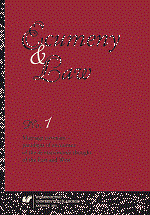“Sunday belongs to the Lord and to us” — in Roman Catholic-Lutheran Families
“Sunday belongs to the Lord and to us” — in Roman Catholic-Lutheran Families
Author(s): Józef BudniakSubject(s): Christian Theology and Religion
Published by: Wydawnictwo Uniwersytetu Śląskiego
Keywords: marriages of different denominations, families of different denominations, Catholics, Evangelical, the Day of the Lord
Summary/Abstract: The Lord’s Day is the very core of Christian life. We may repeat after Franjo Kuharic, the cardinal of Zagreb, the following words “Sunday belongs to the Lord and to us”. Sunday is the day of spiritual strengthening, a day when we can take rest from work, a day of worship, peace and reflection. Sunday is the symbol of dignity and freedom which we are given by God. Thanks to these values, the picture of the true man is formed in our society, and we should continue it that way. Celebrating Sunday is a clear biblical imperative for Christians. In that way the dignity and freedom of the man are retained and basic values of our society are strengthened. Without such understanding of the Lord’s Day there would be only working days left for us. The Roman Catholic Church and the Lutheran Church take a lot of interest in retaining the Lord’s Day because it is an inherent part of the very essence of Christian existence. If a Christian does not celebrate Sunday, they lose their own identity. Sunday is an initiation to reflect upon your own identity. It is done through the participation in the Holy Mass, or the Service of the Word of God. If there is no Sunday Eucharist or Service, Sunday is no more the Day of the Lord. Churches should make couples of different denominations aware that it is of real importance to participate in Sunday Holy Mass or Sunday Service together. They should be joined by the Church. In our times, when Europe is getting united, the question of families of different denominations will concern all Polish citizens. It is necessary for the Churches in Poland to work out a common position on this matter. What is more, they should aim at social education at a large scale to show the specificity of this kind of matrimonies. They should be reminded that “Sunday is a true school, an enduring programme of Church pedagogy – an irreplaceable pedagogy, especially with social conditions now marked more and more by a fragmentation and cultural pluralism which constantly test the faithfulness of individual Christians to the practical demands of their faith” (DD 83). It is a genuine duty of the Churches and Christian communities to see to it that the families of different denominations could duly and fruitfully experience Sunday.
Journal: Ecumeny and Law
- Issue Year: 2013
- Issue No: 1
- Page Range: 63-76
- Page Count: 14
- Language: English

